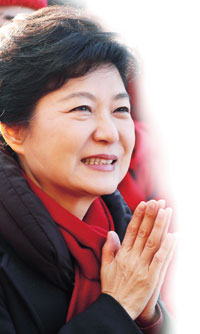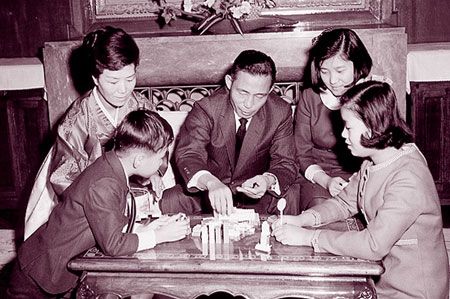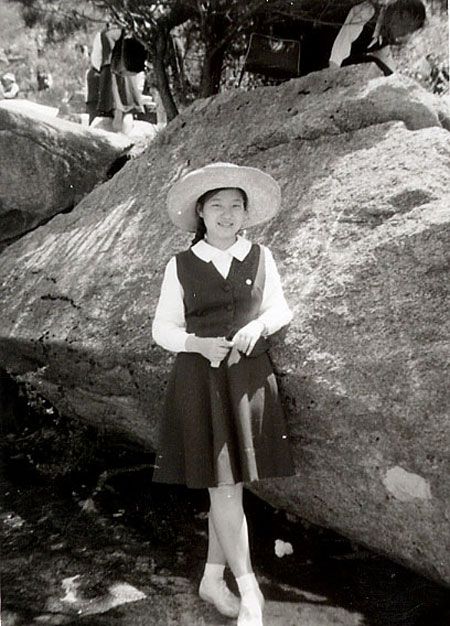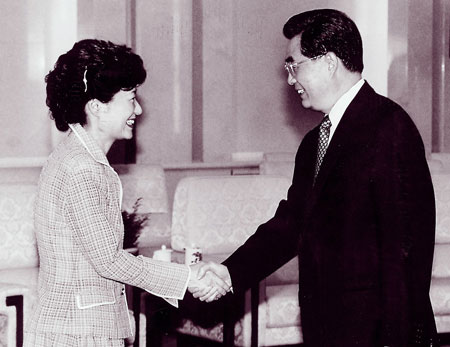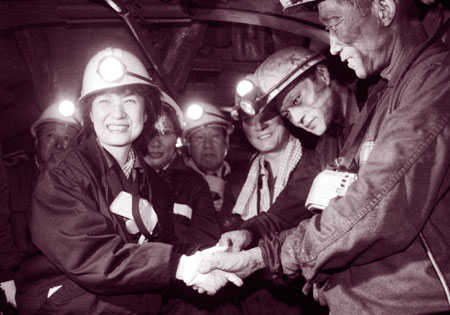President-elect Park Geun-hye said she was born again on May 20, 2006, adding she couldn’t explain what happened to her that day without using the word “miracle.”
It was the day when she was attacked by a man, who sneakily approached her and sliced her face with a box cutter as she headed to a makeshift podium to deliver a campaign speech for then Seoul mayoral candidate Oh Se-hoon at a rally in the capital.
“In retrospect, I instantly realized that death was near. In the beginning, I had no idea how serious my scar was. Sooner or later, however, I realized that it could kill me because the bleeding had not stopped while I was carried to an ambulance to be taken to a nearby hospital,” Park, 60, elaborated what she characterized a life-or-death moment in an autobiography published in 2007.
“The scar was so deep and wide that one of my fingers that I put on my face to stop bleeding went into the cut. When I lay down on the operating table at the Severance Hospital in Shinchon, my late parents, who passed away after being shot decades ago, haunted me. They had never gone away until I woke from the hours-long operation.”
Her parents, former President Park Chung-hee (1917-1979) and first lady Yuk Young-soo (1925-1974), were assassinated in August 1974 and October 1979, respectively.
President-elect Park recalled that she suffered internal agony and her heart wrenched as she thought that her both parents would have gone through the same intense pain that she was going through.
In the midst of the traumatic moment, Park said she was relieved after knowing that a miracle had occurred.
Plus, she recalled, it was fortunate that she was attacked near the hospital and it had a vacant operating room. “Furthermore, Dr. Tark Kwan-cheol, who is a top-notch expert in plastic and reconstructive surgery, was able to lead the operation. He was on his way to a business trip in a local city but was able to return to the hospital as he had just left.”
Groomed as leader
Over the past six decades, Park’s life has taken several dramatic turns. She was once the most envied child as she was raised in Cheong Wa Dae. After her mother passed away in 1974, Park served as acting first lady for five years. Under that capacity, she met numerous foreign leaders, including former U.S. President Jimmy Carter, and their spouses to discuss various issues. Her role in summit diplomacy motivated her to sharpen her English, French, Chinese and Spanish to facilitate conversations with foreign dignitaries.
During that period, Park was groomed as a future leader as she had to brief her father on foreign policy, security and domestic affairs on a daily basis.
There were traumatic moments in her life while in Cheong Wa Dae. Park recalled vividly how she panicked after her mother passed away.
Yuk was assassinated by a North Korean spy in August, 1974 while she attended a Liberation Day ceremony at a gymnasium in Seoul.
The first lady sat behind a podium as her husband delivered a speech and was killed as the last bullet out of three hit her. President Park, a former military man, managed to save his life by hiding under the podium. She was rushed to hospital and underwent over five hours of brain surgery but died that evening.
Park was informed of the tragic news while in France. She was 22. The college graduate had planned to stay in the southeastern city of Grenoble at the foot of the French Alps for six months to hone her French skill. But she had to cut her stay short after being told that “something serious” had happened to her family. At the airport, she saw the front page article of a French newspaper running the story that her mother had been assassinated.
When she returned to Seoul, Park watched how first lady Yuk had been killed on TV as primetime news ran the tragic story with vivid footage for several days until after her mother’s funeral.
Park said the way the media handled her mother’s death was cruel as it caused her extreme grief.
Her life took another tragic turn after her father was assassinated by the head of the Korean Central Intelligence Agency in October 1979. Immediately after her father’s nine-day funeral ended, Park and her two siblings were asked to leave Cheong Wa Dae.
After surviving the following 18-year-long dark years, she joined the political circle as a lawmaker in 1998. The following administrations launched a campaign to discredit her father’s 18-year rule.
President Park’s rule was controversial. Under his leadership, the nation achieved an economic miracle, rising to a middle-income country from one of the poorest nations. But her father’s harsh repression of democracy fighters has hurt his legacy. <The Korea Times/Kang Hyun-kyung>

